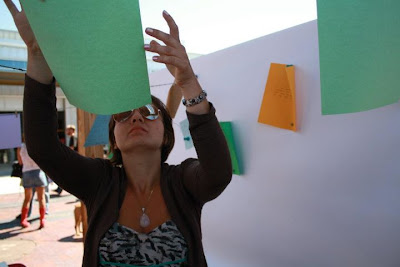I'm in the process of transcribing hours of interviews with 5 American musicians and folk dancers who play and dance to Balkan folk music. We still have at least 4 more conversations to document, and the process so far has been very energizing and fascinating. Below is one answer from New Mexican folk dancer, anthropologist, and historian, Amy Mills:
Alysha: What roles do you think Balkan folk music and dance have in America, just in the context of capitalist, kind of alienated, antisocial...
Amy: Well, I was just thinking about this earlier today. This stuff isn't really-- I mean ultimately whether people do Balkan music or dance is really irrelevant to everybody except the people who already do it. But in the big picture, I think everybody needs something like this, and I don't really care what color they are, or race or background, or ethnicity-- everybody needs a sense of community, because I think the community gives people a sense of responsibility to one another. If you don't have a sense of responsibility to other people then, you know, why not screw up the environment completely, why not rob people on the street, why not give bonuses to people on Wall Street for screwing over the rest of the country. Why would you care about anybody, if you didn't have a sense of responsibility?
Now our society has, in the United States, especially white people's society, has gotten to the point where people aren't as engaged with various communities, because we move a lot, because a lot of us don't go to church anymore-- I'm not saying that's a bad thing, but it was a community-- up to the individual-- but it was a community that gave you a sense of responsibility. We have had this idea for a long time of the “melting pot.” Well, when you had the melting pot, if you gave up everything that gave you a sense of being a Scandinavian American or a Mexican American, then what did you have left as a sense of community?
So we're at this point I think in the United States, where a lot of people, really really crave community. They crave human closeness. The internet is not going to provide all of that. You can't hug the internet. You can't laugh with the internet, and you can't look at its eyes, and you can't hold its hand and do a dance, and you don't have as much of a strong sense of responsibility to the people on the internet. There are lots of studies that have said that. Just look at the flame wars. That will tell you pretty much how that happens for most people. It does have some value, but you can't replace a sense of community, face-to-face community.
And so, I think that what the Balkan community does, or communities, is it provides that for some people. I think Americans are at this point-- a lot of Americans anyway.-- where the only way they're going to find a sense of community is by choosing that for themselves. Which is a pretty big burden. “Oh my god, I have to choose my own sense of identity-- everything is up for grabs.” That's a lot of pressure.
But finding a community actually limits the amount of choices that you tend to make or have to make, and it actually turns out that it makes people happier. Not unlimited, and not totally limited. Community gives you that sense of responsibility, it gives you limited choices, and it gives you people that you can relate to. And I think that the depression that we fight with in the United States to a greater and greater extent is partly derived from too many choices. Too much pressure to make the perfect choice, and not having a sense of community and other people around to listen to you, to smile at you, to give you feedback, and to support you, and you need it. I think what we're doing is a tiny piece of that for our particular group of people. I think that needs to happen all over the United States, in whatever realms people are going to choose, and whatever realms they're born into.
So, I have a very small vision on this one. [laughs] But I do know that this particular community is not the answer for everybody. I like people to see it in the first place so they can make that choice.







 It has been almost a year since I purchased my prewar Argus A2B at a pop-up vintage boutique in Santa Fe. The camera from the 1930s only cost me $18, and it has served as a curious decoration. It's only now that I realize it is a functional 35mm camera with a remarkable history. It is an elegant piece of analog machinery, and I look forward to shooting many, many rolls with it. If there are light leaks, I hope they're interesting.
It has been almost a year since I purchased my prewar Argus A2B at a pop-up vintage boutique in Santa Fe. The camera from the 1930s only cost me $18, and it has served as a curious decoration. It's only now that I realize it is a functional 35mm camera with a remarkable history. It is an elegant piece of analog machinery, and I look forward to shooting many, many rolls with it. If there are light leaks, I hope they're interesting.









































